Day 1 | Day 2 | Day 3 | Day 4 | Day 5 | Day 6 | Day 7 | Day 9 | Day 11
Link to Elizabeth Choe's Page on Tumblr
Day 1 Thoughts
> Download from iTunes U (MP4 - 3.9MB)
> Download from Internet Archive (MP4 - 3.9MB)
Phew! Day 1 over. Man, 3 hours goes by waaaay faster when you're talking than when you're listening. Thanks for being a good audience, you guys are troopers. Let me know if lecture starts feeling too tedious or if you all want me to break up the sessions more.
Y'all are a Quiet bunch! But I suppose that is to be expected on the first day. We'll be sure to shake things up tomorrow… Loved hearing people's experiences with video, and it was interesting to see how my personal tastes aligned (distaste of Khan Academy - agree with Paul on that one, and then same with the +1 for Veritasium with Andrea) or didn't align with that of others.
It was really funny hearing Chris talk about the plastic elements of film today, because I took his documentary - making class, DV Lab, and heard him talk about that stuff maybe 4 years ago (holy crap), and I never thought I'd be using that information again (and then that class got me started down the video production rabbit hole, and now here I am trying to make a career out of it). That really is one of the hardest mentalities to overcome, though - the camera, casting, lighting… all that stuff is changeable and in your control! We just tend to get lazy about it or just do things the way they've always been done (and when it comes to educational video, I think we could use some change). I'll be talking about producing later in the week where we'll delve into the practicalities of those things, but just keep in mind that you have the ability to make things "a little bit better," as Hank Green would say.
The 3 - act structure of web video that Chris talked about was something I hadn't been able to verbalize or encapsulate like that - I'm going to have to steal that from him. I, too, also love the concept of making the unfamiliar familiar (and vice versa even more) - you thought you knew stuff about snot? Oh snap, turns out, you didn't, and it's weird and awesome as hell.
Day 2 Thoughts
Another day down. I have to admit, I was pretty stressed about this one during class planning because of all of the moving parts, but I suppose stress is bound to happen anytime you're adding 20 6th graders to the mix. I do want to emphasize that you can take everything we (all the teaching staff, today's "guest lecturers") say with a grain of salt. Walter Murch (editor of Apocalypse Now, Godfather III, and many others) says in his book,  Murch, Walter. In the Blink of an Eye: A Perspective on Film Editing. Silman - James Press, 2001. ISBN: 9781879505629.
Murch, Walter. In the Blink of an Eye: A Perspective on Film Editing. Silman - James Press, 2001. ISBN: 9781879505629.
You shouldn't blindly follow what you learn from… test screenings any more than you should anything else… [they are] just a way to find out where you are. (54)
Hopefully today was just a way to see where you are from another perspective. I know it can be overwhelming sometimes to be bombarded with seemingly conflicting opinions and lots of abstract ideas - I promise that as soon as you start committing some ideas to paper, the concrete process will become so much clearer. Remember - "good" is difficult to define because "good" is often a matter of taste. The priorities here are the four class values: Spark, clarity, thoughtfulness, and challenge.
I was talking to Joshua and Ceri after class about how the pursuit of perfection on the first try can often cripple us and prevent us from trying in the first place. "Kill your darlings" has sort of become a professional mantra of mine, because so many of the ideas and work that I do end up being thrown away before getting to final products, and that's okay. Actually, that process of creating and discarding is so vital, but perhaps we've become conditioned to ensuring that we only create darlings worth keeping with our scientist / engineering training (which I find problematic).
It was so interesting to hear Natalie's perspective of a non - producer attempting video from a scientist's perspective, and so refreshing to hear her honest reflections of what worked and what didn't. BioBuilder really has discovered its niche in using video to highlight their real value proposition, which is the activities, rather than relying on the videos as their main products. I think that was a really smart decision. I do think that video is sort of blindly embraced by the scientific / engineering community - they recognize that there's power in it, but don't necessarily take the time or effort to understand how to best leverage that power. That's why there is so much embarrassingly sub -par video content that's promoted by scientific heavyweights. Just this morning, I was looking at the winner's of last - years video contest sponsored by the National Academy of Engineering and did some hardcore facepalming.
I forgot to mention this during class, but there were really great and interesting points brought up regarding the readings last night. I will try to address some of those points in the coming lectures.
I'm really excited about the group of students we have in this class and to see you all opening up more about your creative process and questions. Don't hesitate to let the teaching staff know how we can best help you throughout this process.
Day 3 Thoughts
> Download from iTunes U (MP4 - 10MB)
> Download from Internet Archive (MP4 - 10MB)
This video is courtesy of Elizabeth Choe on YouTube and is provided under our Creative Commons license.
Day 4 Reflections
Another day down. Hope you found this one fun and maybe brought more tangible examples of what works and what doesn't in the world of scriptwriting / video. I do think it's funny to think about what everyone's reaction to taking out the line about density in that Planet Nutshell video would've been before this class… perhaps we wouldn't have been so willing to comply with a less precise (but more accurate) script?
It was hard to figure out the best way to teach this class because so many of the "units" aren't actually free - standing modules of information - storyboarding ties into scriptwriting which ties into hosting which ties into visual planning… it's more like a web of interconnected elements rather than a train of sequential lessons. Hopefully you all are starting to recognize that, too!
I love the brainstorming that is happening in this ideation phase, but it really is so striking to see how crippling the perfection of an idea can be. It is a universal experience - every student I have worked with on Science Out Loud (including myself!!) has this fixation on measuring 20 times, cutting once. Maybe it's our nature as engineers and scientists to exhaust the research phase before going into prototyping. But here's the thing - in production, the reality is that we will be measuring 20 times and cutting 40 times. No matter how perfect your idea is, in many ways, the scripting process is what helps you refine (or even completely redo) your idea, and you will be re - scripting regardless of the level of perfection of your idea. Getting a script down on paper is - I promise - the most productive thing you can do to propel yourself forward. Even if you end up scrapping the entire script! But at least with a script that you toss, you have a better sense of what direction to move, whereas if you ruminate too much, you're left in this fog of ideas.
The other thing is, the point of these videos should not be "how xyz happens" or "why xyz exists" - your point will be something bigger and in the process of reaching that point in your video, you will have explained to the audience what xyz is. For example, if you asked me what the point of my snot video is, I could say: "My video explains the chemistry behind farts." But what the real thesis is, is: "There's an incredible material that defends organisms, can differentiate between biological objects, that can self - heal… and it's a material that we take for granted everyday and every moment we throw away a tissue - it's our own snot." (Eh, maybe the wording can be better, but you get my point.) I actually think this is a really powerful way to frame your thinking when you write scientific papers, do talks, write grants, pitch anything. If a layperson asked what the point of giving talks at conferences is, I think a lot of people would answer, "To explain my research." But that objective can only get you so far, you know? Explaining your research is sort of a happy consequence that comes from you shooting to tell the story or argument of your research.
tl;dr write a script! It's okay if you end up changing it! And really challenge yourself to write a point about your video (something beyond "My video is about how ___ works").
P.S. Totally empathize with how difficult this is, you all are doing a great job.
Day 5 Thoughts
Week one - Down! I do recognize that the coursework may have been heavy this week, but I just want to reassure you that I front - loaded this class to set you all up in the best way possible for the rest of the month. Tuesday will be the last "lecture" of the class, with every other day being open to classwork (table reads, screenings and time to film). We just wanted to best equip you all for the open time ahead.
It was so great hearing everyone's "revised" pitches at the beginning of the class. I hope you see how different your points are with just a little reworking of your frame of mind and wording. These will ultimately help you create a stronger video (or talk or presentation!).
Hope you all had fun getting to work with the equipment today. I was watching Kenneth and PJ (FYI, Paul is actually a PJ, as I learned today) as they recorded because they stayed in the classroom, and it made me smile that 1) PJ offered the same directorial advice I was about to give ("Try one where you don't emphasize the word 'pizza' too much") and that 2) they tried some creative shots:

I can't emphasize enough how awesome it is seeing you all brainstorm and work together-as Josh, Chris, and George have all said before, filmmaking is a process that depends so much on collaboration (I can't imagine teaching this class without them, for instance).
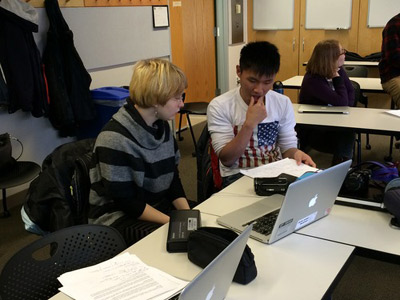
It's 4:30 right now and Joshua and Nathan just came back from filming in Nathan's dorm (which, in my opinion, is the coolest one to see at MIT)… so, see? Lots of great things come out of not having to film by yourself:)
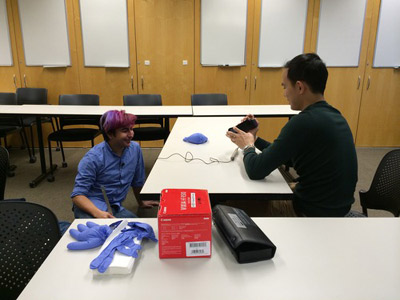
Very, very happy with the progress everyone is making, and even more excited to see where'll you all go next week.
Day 6 Thoughts
Well… table reads always go more awkwardly than I always anticipate them to be. Not sure why I'd think otherwise - I mean, you're gathering a bunch of people and expecting them to freely share their creative work and then critique that of others… as per usual, you all were troopers.
Can you believe we only started this class one week ago? Today was a lot of script - reworking, but I don't want to trivialize the amount of work that it took to get them to where they were today. Lots of improvements all around.
Working with this class has made me realize more and more how much our traditional education informs the way we approach things, for better or for worse. Take the five - paragraph essay format, for instance. Why are we so averse to opening with the money shots (that's my instinct as well as a writer - I feel like I have to sufficiently explain and define everything before I start) and to think contextually? There's a fine line between being click - bait-y and hook - oriented thinking, but sometimes I feel like academia could use a lot more of it (as long as it backs it up, of course). I had a really interesting conversation with Ceri after class about why there's so much crappy science / educational media out there, and why it may be because as students, we're used to emulating things that have worked for us in the past or the things that are the best that's out there for now. We often seek templates, and if they don't exist, we copy things that have seemingly "succeeded" (maybe why there are so many Khan Academy knock - offs out there).
I'm also feeling a lot of time crunch - pressure to finish lectures, to finish drafts, to finish the project… I racked my brain thinking of the best way to pace this class, and even so, we're still super pressed for time. What have been the most vital components of this class so far? Do you think there are things I could've taken out? I thought about just having one - on -one feedback with drafts just using Google Docs, but I wonder how much you would've missed out on by not reading your complete scripts aloud to the class and seeing their reactions and feedback (and hearing the teaching staff's feedback for other scripts)…
Day 7 Thoughts
I echo Ceri's sentiments - the scripts have come along very, very far. You may want to watch your original pitches sometime this weekend, just to see the comparison… (both text and delivery!) Not to be too trite, but it really is so awesome hearing people give feedback to each other during class.
I realize it's a bit difficult to teach and understand editing without just trying it for yourself… a lot of it really is a matter of taste and preference (remember the class where Chris said that his film school profs never let people cut before 4 seconds? That seems crazy - long to me now.). I could talk on and on and on about editing… I think it's the most undervalued role in production, but then again, the whole point of editing is to be as "unseen" as possible (whereas the talent is meant to be seen as much as possible). If you're interested in more of the "art" of editing, I highly recommend  Murch, Walter. In the Blink of an Eye: A Perspective on Film Editing. Silman-James Press, 2001. ISBN: 9781879505629. I think it makes a lot of sense to non - video types, and found it to be a unexpectedly beautiful reflection of how to look at the world - editing is that, isn't it? Representing a reality by examining the reality at your disposal… Anyway, I wanted today to be a pragmatic approach to post-production, but at the same time, there is so much you can miss out on when it's reduced to a this - is - what - buttons - you - push - when - you - edit lesson.
Murch, Walter. In the Blink of an Eye: A Perspective on Film Editing. Silman-James Press, 2001. ISBN: 9781879505629. I think it makes a lot of sense to non - video types, and found it to be a unexpectedly beautiful reflection of how to look at the world - editing is that, isn't it? Representing a reality by examining the reality at your disposal… Anyway, I wanted today to be a pragmatic approach to post-production, but at the same time, there is so much you can miss out on when it's reduced to a this - is - what - buttons - you - push - when - you - edit lesson.
Somewhat unrelated, but something I've been thinking about a lot lately: Ira Glass Interview on Why This American Life Feels So Different from Other Public Radio.
Public radio is good at being timely and analytical and giving you the news and doing all these things very, very solid… but what we want to do is take the smell of broccoli out of the air…
I think a radio show is better when the presenter, when the reporter exists as a person and, like, I feel like then there's more to listen for.
Day 9 Thoughts
Today I followed Yuliya / PJ / Kenneth around for a bit as they filmed part of Yuliya's video on fractals in E ast Campus (a dorm nearby, for those of you who are unfamiliar).
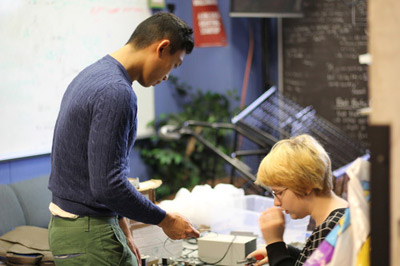
(Just a little creepin' 'round the corner, don't mind me…)
Beyond anything, I am thrilled with how you all are approaching shots, planning, hosting… I heard some great directorial advice from the guys. I know you are working under very tight time constraints and not the greatest equipment, and it's okay if you don't make a YouTube show. What's most important is that you can identify how to make things better / why things work or don't work in video, etc… and from what I'm overhearing, a lot of that is happening.
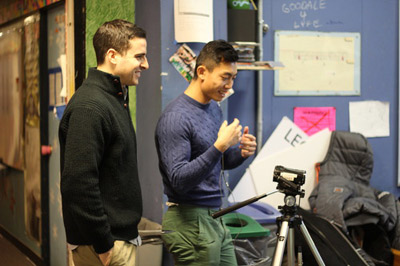
(Look! PJ's smiling!!)
Then I hopped back over to the classroom, where Ceri was giving a brief tutorial on using the tablets in Illustrator to eventually create simple animations (jumping goats, in Andrea's case). Again, I know there's not a whole lot of time to create sweeping animations, but hopefully this gives you a little taste of some of the video production techniques you can play with long after this class ends.
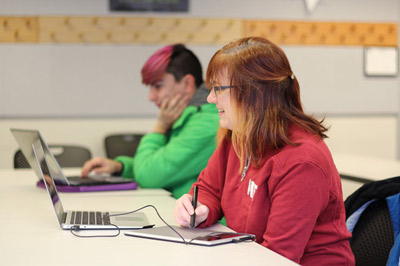
(Smiles from everyone today! Huzzah.)
I'm guessing David and Joshua were filming in the hotel this afternoon - can't wait to see how all that turns out. Home stretch! Ceri and I will be around and online this weekend if anyone needs help.
Day 11 Thoughts
> Download from iTunes U (MP4 - 8.2MB)
> Download from Internet Archive (MP4 - 8.2MB)
This video is courtesy of Elizabeth Choe on YouTube and is provided under our Creative Commons license.
